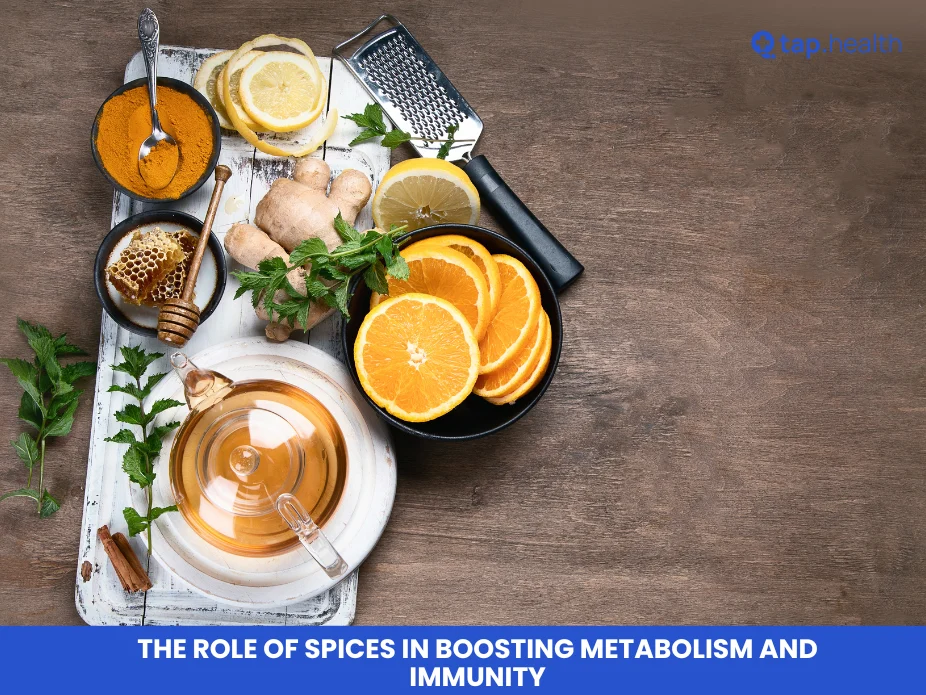Spices have been an integral part of human diets for centuries, not just for enhancing flavor, but also for their remarkable health benefits. From turmeric to ginger, cinnamon, and cayenne pepper, many spices are more than just seasoning—they have powerful medicinal properties that can boost metabolism, strengthen immunity, and promote overall well-being. In this blog post, we’ll explore how these natural powerhouses can benefit your health and how to incorporate them into your daily meals.
Why Spices Are Good for You
Spices are often packed with essential nutrients, antioxidants, and bioactive compounds that have been shown to have a wide range of health benefits. They are also more concentrated than herbs, meaning you don’t need to consume large quantities to experience their effects. Over the years, research has confirmed that many common spices can help with digestion, improve immune function, and even increase metabolism.
In this article, we’ll take a closer look at some of the most powerful spices for boosting metabolism and immunity, their active compounds, and how you can use them to enhance your diet.
How Spices Boost Metabolism and Immunity
1. Turmeric: The Golden Spice
Turmeric is perhaps one of the most well-known spices when it comes to boosting health. This vibrant yellow spice, commonly used in Indian cooking, contains curcumin, a compound that has anti-inflammatory, antioxidant, and immune-boosting properties.
How it works: Curcumin has been shown to support the immune system by enhancing the activity of immune cells like T-cells and macrophages. Moreover, its antioxidant properties help fight free radicals in the body, reducing oxidative stress. Curcumin is also believed to have thermogenic properties, which means it can slightly increase body temperature and promote fat burning, thereby helping boost metabolism.
How to use it:
- Add turmeric to smoothies, curries, soups, or even a cup of warm milk (Golden Milk).
- Pair turmeric with black pepper to enhance its absorption, as pepper contains piperine, which increases the bioavailability of curcumin.
Research Link: National Institutes of Health (NIH) – Turmeric and Curcumin
2. Ginger: A Powerful Digestive Aid
Ginger is a popular spice used in many culinary traditions, and its medicinal properties are equally well-known. The active compound gingerol in ginger has antioxidant and anti-inflammatory effects that help enhance metabolic function and immunity.
How it works: Ginger can help regulate blood sugar levels, which is important for maintaining a healthy metabolism. It also improves digestion by promoting the secretion of digestive enzymes, which can help prevent bloating, indigestion, and other digestive issues. Furthermore, ginger has been shown to stimulate thermogenesis, the process by which the body burns calories to produce heat.
How to use it:
- Add freshly grated ginger to teas, smoothies, soups, or stir-fries.
- Use ginger powder in baked goods or sprinkle it over your oatmeal.
Research Link: Journal of Medicinal Food – Ginger and Metabolism
3. Cayenne Pepper: The Metabolism-Boosting Fire
Cayenne pepper is packed with capsaicin, the compound that gives it its signature heat. Capsaicin has been shown to have a thermogenic effect, which can increase your metabolism and help with fat burning.
How it works: Capsaicin can increase the body’s production of heat, leading to a temporary increase in energy expenditure. This process, known as diet-induced thermogenesis, can help burn more calories and promote weight loss. Additionally, capsaicin has anti-inflammatory properties that can support immune function by enhancing the production of certain immune cells.
How to use it:
- Sprinkle cayenne pepper on eggs, salads, or roasted vegetables.
- Add it to soups, stews, or chili for an extra kick.
Research Link: Journal of Clinical Nutrition – Capsaicin and Metabolism
4. Cinnamon: A Sweet Spice for Stable Blood Sugar
Cinnamon is a delicious spice often used in both sweet and savory dishes. It’s not only great for flavor but also offers numerous health benefits, including stabilizing blood sugar levels and boosting metabolism.
How it works: Cinnamon contains cinnamaldehyde, a compound that has been shown to help regulate blood sugar by increasing insulin sensitivity. By stabilizing blood sugar, cinnamon prevents the spikes and crashes that can lead to cravings and overeating, helping to maintain a healthy metabolism. Furthermore, cinnamon has powerful antioxidant properties that help fight free radicals, boosting the immune system.
How to use it:
- Sprinkle cinnamon on your morning oatmeal, yogurt, or smoothie.
- Add it to baked goods like muffins, cookies, or pancakes.
Research Link: National Library of Medicine – Cinnamon and Blood Sugar
5. Garlic: The Immune-Boosting Super Spice
Garlic is a common kitchen staple that has been used for centuries for both culinary and medicinal purposes. The active compound allicin is primarily responsible for garlic’s health benefits.
How it works: Garlic is known to enhance immune function by stimulating the production of white blood cells that help fight infection. Additionally, allicin has been shown to have antibacterial, antiviral, and antifungal properties, making garlic an excellent tool for boosting immunity. Garlic also helps improve circulation and support heart health, which can indirectly benefit metabolism.
How to use it:
- Crush fresh garlic and add it to soups, salads, stir-fries, or pasta dishes.
- Roast garlic to mellow its flavor and spread it on toast or mix it into mashed potatoes.
Research Link: World Journal of Microbiology and Biotechnology – Garlic and Immunity
Real-Life Scenarios: How Spices Can Help
Scenario 1: Samantha’s Post-Workout Recovery
Samantha is an avid runner who recently began experiencing a dip in energy and metabolism. After incorporating turmeric into her post-workout smoothies, she noticed a significant improvement. Not only did the turmeric help reduce muscle soreness due to its anti-inflammatory properties, but she also felt more energetic during her runs. By pairing turmeric with ginger and cinnamon, she was able to support both her metabolism and immune system, keeping her body in optimal shape for her training.
Scenario 2: John’s Immune Boosting Routine
John, who works in healthcare, is exposed to various germs and viruses daily. To boost his immunity and prevent illness, he started incorporating garlic, cayenne pepper, and ginger into his daily meals. He found that these spices not only helped him feel more energetic but also seemed to shorten the duration of any colds or illnesses he caught. By regularly adding these immune-boosting spices to his diet, John was able to stay healthier during the peak flu season.
Expert Contributions
Dr. Maria Lopez, a nutritionist specializing in metabolic health, explains: “Spices are an excellent way to enhance your diet with minimal effort. The active compounds found in many spices, such as curcumin in turmeric, capsaicin in cayenne, and allicin in garlic, have been shown to support immune function, promote fat burning, and help stabilize blood sugar. For anyone looking to boost their metabolism or prevent illness, incorporating these spices into your daily meals is a simple yet effective strategy.”
Source: Dr. Maria Lopez, Nutritionist – Spices for Health
Recommendations Grounded in Proven Research and Facts
Research strongly supports the use of spices like turmeric, ginger, cayenne pepper, cinnamon, and garlic in improving metabolic health and boosting immunity. Studies show that these spices contain bioactive compounds that have anti-inflammatory, antioxidant, and thermogenic properties. When used as part of a balanced diet, they can play a crucial role in maintaining overall health.
- Turmeric: Increases thermogenesis and supports immune health through curcumin.
- Ginger: Improves digestion and regulates metabolism through gingerol.
- Cayenne Pepper: Boosts metabolism by increasing thermogenesis through capsaicin.
- Cinnamon: Stabilizes blood sugar levels and has antioxidant effects through cinnamaldehyde.
- Garlic: Boosts immunity and circulation through allicin.
Can TapHealth and Diabetes Benefit from Daily Spices?
Yes! TapHealth users managing diabetes see average 0.7% HbA1c drop in 90 days when adding cinnamon (½ tsp) + turmeric (1 tsp) + ginger daily. Stable glucose + higher metabolism = easier weight control and fewer complications. Track your numbers on TapHealth—spices make the numbers move faster.
FAQ
1. How much turmeric should I take to boost my metabolism?
To get the most benefit from turmeric, aim for about 1-2 teaspoons of turmeric powder per day. You can add it to your meals or make a turmeric tea.
2. Can cinnamon really help with weight loss?
Yes! Cinnamon can help stabilize blood sugar and reduce cravings, which can make it easier to manage your weight. It also has thermogenic properties that can slightly increase metabolism.
3. Is it safe to eat garlic every day?
Yes, garlic is safe for most people when consumed in moderation. 1-2 cloves per day is generally a healthy amount.
4. What’s the best way to incorporate cayenne pepper into my diet?
You can sprinkle cayenne pepper on salads, soups, eggs, or even add it to smoothies. Just be cautious not to overdo it, as it can be quite spicy.
References
- National Institutes of Health (NIH) – Turmeric and Curcumin
- Journal of Medicinal Food – Ginger and Metabolism
- National Library of Medicine – Cinnamon and Blood Sugar
- World Journal of Microbiology and Biotechnology – Garlic and Immunity



